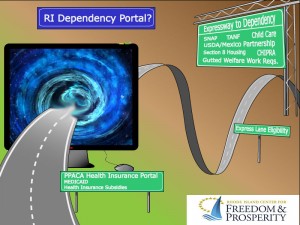STATEMENT: UHIP Cost Overruns Just the Beginning of ‘Dependency Portal’ Costs
STATEMENT
September 10, 2015
UHIP Cost Overruns Just the Beginning
“Dependency Portal” will dramatically drive up social service costs.
New “uninsured” figures misleading.
Providence, RI — Chalk up another accurate projection based on research by the nonpartisan Rhode Island Center for Freedom & Prosperity.
The near quarter of a billion dollars in ballooning cost over-runs recently projected by the RI Department of Health, is just the tip of the iceberg, according to the Center, which for years has been warning about the unsustainable costs associated with the Unified Health Infrastructure Project (UHIP).
With a similar net cost to Rhode Islanders as the 38 Studios debacle and the initial 38 Stadium proposal, the UHIP project is yet another example of government inefficiency and special interest spending, which will consume upwards of $77 million in state taxpayer dollars as well as hundreds of millions from federal taxpayers. The now $364 million boondoggle was initially budgeted to be $135 million.
 But the final cost of UHIP could end up dwarfing these figures for Rhode Islanders, notwithstanding additional annual operational costs. A major goal of UHIP is to ensure that the state provides as much social service aid to as many people as possible. Nicknamed the “Dependency Portal” by the Center in 2012, UHIP will proactively promote people’s eligibility for a wide array of public assistance programs, based on the financial and personal information they submit to the state when applying for a healthcare exchange subsidy or for Medicaid.
But the final cost of UHIP could end up dwarfing these figures for Rhode Islanders, notwithstanding additional annual operational costs. A major goal of UHIP is to ensure that the state provides as much social service aid to as many people as possible. Nicknamed the “Dependency Portal” by the Center in 2012, UHIP will proactively promote people’s eligibility for a wide array of public assistance programs, based on the financial and personal information they submit to the state when applying for a healthcare exchange subsidy or for Medicaid.
“It is one thing to upgrade informational systems; it is an entirely different issue when those upgrades are used as a strategic tool to encourage people to become dependent on government assistance, and driving up costs for taxpayers,” warned Mike Stenhouse, CEO for the Center. “It is not the proper role for government to discourage a productive and self-sufficient lifestyle.”
Following the state’s aggressive implementation of the President’s Affordable Care Act, or Obamacare, by erecting a costly exchange and by expanding Medicaid, Rhode Island taxpayers are already suffering from a $50 million or so increased annual burden for previously eligible Medicaid participants, not to mention an even higher Medicaid bill for the state is expected once the federal government ends its 100% subsidy for newly eligible participants.
Most costly, once UHIP’s “dependency portal” function kicks in, it is anyone’s guess as to how much higher other social service programs will rise in cost each year, such as welfare, SNAP, TANF, housing and childcare assistance, etc …
While the Center recognizes that it may be beyond point-of-no-return with the UHIP project, the Center encourages legislative leaders to closely monitor and prohibit strategic use of UHIP to dramatically expand Rhode Island’s social services network, as opposed to what should be its goal to improve the state’s administration of that same network.
In a related development, with regard to the latest drop in uninsured rates touted by the DOH, given that the vast majority of the newly insured have signed up for Medicaid and did not purchased private insurance via the state’s health insurance exchange. While some believe these Medicaid increases are a major step towards a single-payer, socialized healthcare industry, the Center believes the new figures do not represent a major success for the exchange and do not justify that RI taxpayers should continue to fund its highly expensive annual operations .
Media Contact:
Mike Stenhouse, CEO
401.429.6115 | info@rifreedom.org
About the Center
The nonpartisan RI Center for Freedom & Prosperity is Rhode Island’s premiere free-enterprise research and advocacy organization. The mission of the 501-C-3 nonprofit organization is to return government to the people by opposing special-interest politics and advancing proven free-market solutions that can transform lives by restoring economic competitiveness, increasing educational opportunities, and protecting individual freedoms.
